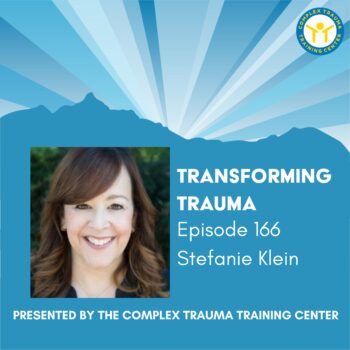Transforming Trauma Episode 166: Therapist Origin Story Series with Stefanie Klein, CTTC Faculty
A podcast brought to you by the Complex Trauma Training Center
In this special Transforming Trauma series, we will be exploring the “origin stories” of influential therapists. These episodes offer a rare opportunity to peek behind the curtain and understand what inspired these therapists to pursue healing work – and how they have brought their life experiences into their professional work, impacting and inspiring many people along the way. By learning from seasoned master therapists who openly share their professional journeys, as well as the painful personal life lessons along the way, we gain valuable insights to support our own growth, both professionally and personally.
On this episode of Transforming Trauma, host Emily Ruth re-introduces Stefanie Klein, a licensed clinical social worker who is Faculty and Assistant Training Director for the Complex Trauma Training Center (CTTC). Stefanie shares the pivotal a-ha! moments that guided her path to becoming a therapist, her post-graduate placement trajectory, and the healing modalities that have most influenced her life and professional work.
“When I think about what made me into a therapist, I often joke that it was debilitating symptoms of developmental trauma.” Stefanie’s opening line sets the tone for a candid discussion that will resonate with many mental health professionals and those considering a career as a helping professional. “I was a very young child suffering with so much anxiety,” she continues. “Nobody understood anything then. So, I was just the identified patient in my home.”
For those unfamiliar with the term, an identified patient refers to a family member – generally the most sensitive child within a family – who is viewed as the primary source of the family problems. “Everyone in the family starts to focus on that person and makes them feel like if they could just ‘be normal,’ then everybody would be okay,” says Stefanie, who asked for professional help at age 10. “I had a parent who was in therapy and was open about being in therapy,” she recalls, adding, “That’s how I knew it was okay to ask for it.”
Stefanie began as a young client in the 1970s, a time she remembers as having fewer modalities focused specifically on childhood developmental trauma. “I was in therapy for two years straight with this very Freudian type, pipe-smoking man. It was crazy and, ultimately, amazing!” Stefanie’s sessions included talk therapy, dream analysis, and building model airplanes together. “I came to understand what was going on with me,” she says.
Those early experiences informed Stefanie’s decision to become a therapist. She eventually enrolled at UCLA and worked at the Betty Ford Clinic. “I did a lot of addiction work, but I never really asked myself, what do I want? What’s my passion?” She stumbled upon the answer — trauma and spirituality — after attending an event featuring Peter Levine. “It was so hopeful! I didn’t understand that I had a body or nervous system or anything, nor was I doing therapy with people in a way that included the body,” she recalls. “All of a sudden, all of these pieces kind of fell into place, and I was like, I’m doing this three-year training!”
But that was just the beginning. Stefanie went on to train with Lawrence Heller, MD, the creator of The NeuroAffective Relational Model®. “NARM really still feels like the model that speaks to me in the way I wanna work,” she explains. “It’s a brilliant model, but I think what I discovered from years of NARM teaching, consultation, and everything, was that my real passion was mentoring therapists.”
This led to Stefanie joining long-time colleagues and friends Brad Kammer and Marcia Black in developing the Complex Trauma Training Center (CTTC). In their many years of supporting mental health professionals, they saw that therapists were searching for more than just clinical training, but looking for personal support through professional community. They wanted to create an organization that reflects the passion that they had developed through their work as therapists, teachers, consultants, and mentors. Stefanie is especially proud of the work the team has done to launch the SPACE Inner development Program for Therapists. “No matter what model someone practices, it’s turning the focus inward to inside-out learning, and nurturing the person.”
Transforming Trauma thanks Stefanie for her generosity of spirit and giving us this special glimpse into the transformative journey of how someone seeking healing from a young age can share their learning with the world in deep and meaningful ways.
RECOMMENDED EPISODES
Creating SPACE for Self-Discovery and Community Support for Therapists
GUEST BIO & CONTACT
Complex Trauma Training Center
Stefanie Klein is a Licensed Clinical Social Worker who serves as the Assistant Training Director for the Complex Trauma Training Center (CTTC) where she is also a consultant and faculty in NARM® Trainings and the new SPACE program for psychotherapists. Stefanie has 30 years of experience practicing psychotherapy with adults in her Los Angeles private practice and has specialized in treating trauma and anxiety for the past 20 years. In her role as a mentor and teacher of psychotherapists working with complex trauma, she is most inspired by the desire to support other therapists to not only feel more effective in their work with clients, but to also experience more ease and fulfillment in their professional roles.

Subscribe for All Episodes
on your Favorite Service:
We want to connect with you!
Facebook @ComplexTraumaTrainingCenter
Twitter @CTTC_Training
YouTube
Instagram @cttc_training
Learn more about The Complex Trauma Training Center: http://www.complextraumatrainingcenter.com